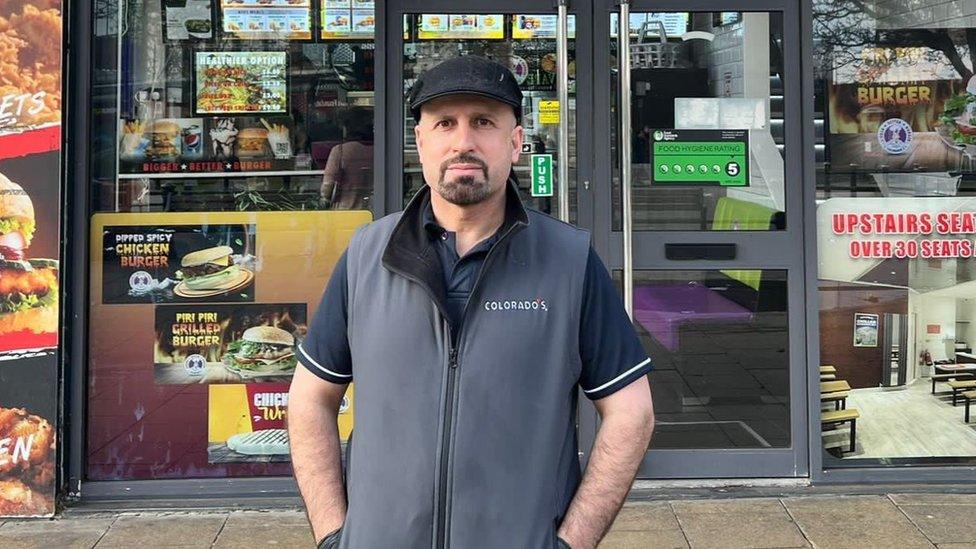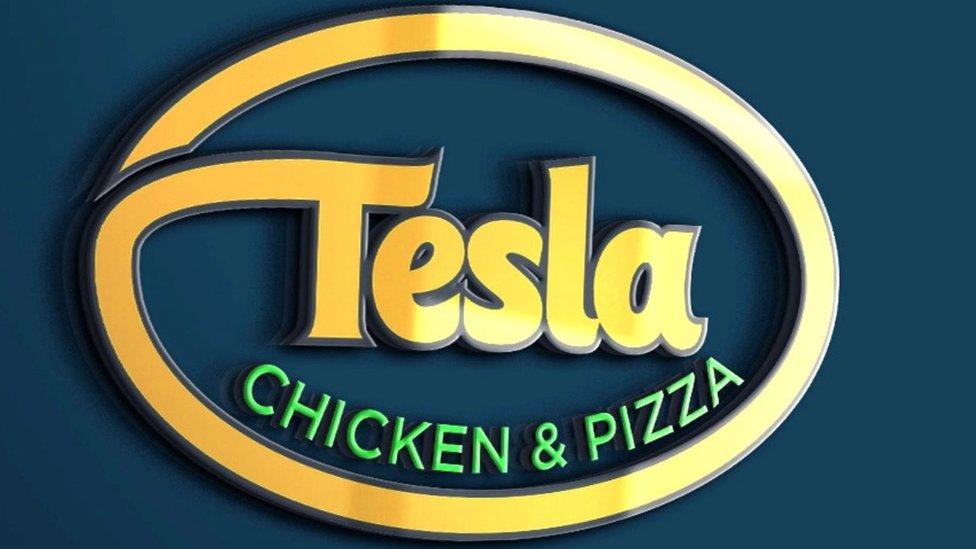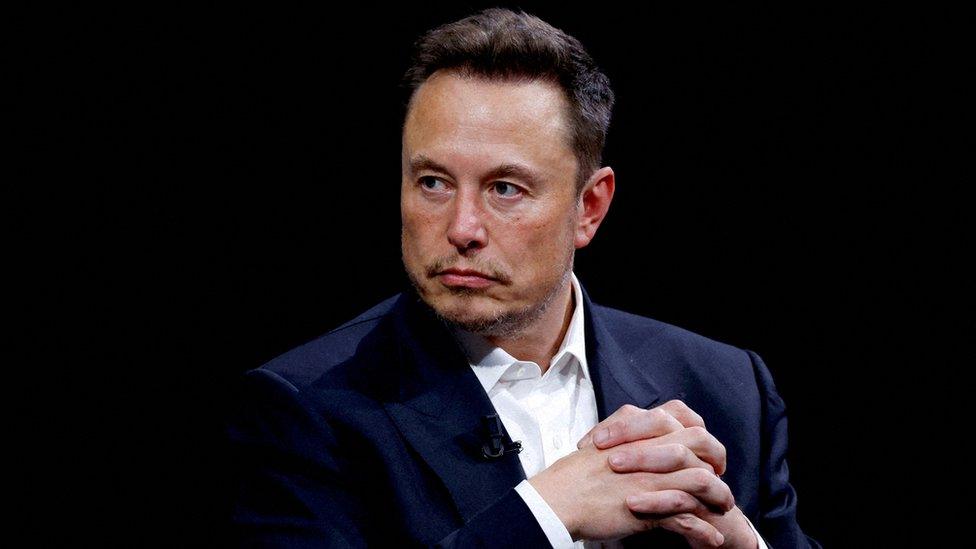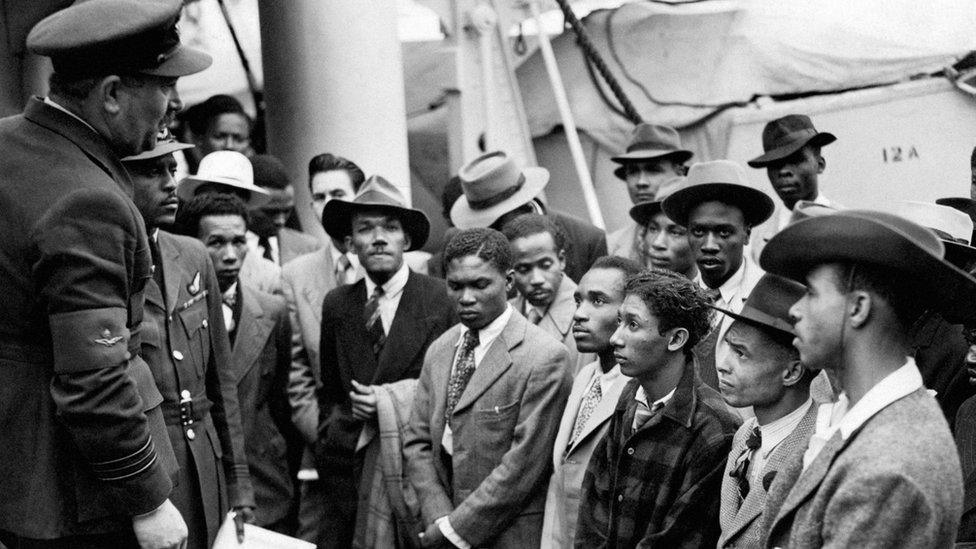Bury chicken shop boss loses £12,000 in Tesla trademark row
- Published

Boss of Colorado's Chicken, Amanj Ali, opposed Tesla's attempt to register its name for food and drink services in the UK
A chicken shop owner in Greater Manchester who took on Tesla in a trademark dispute has been left £12,000 out of pocket after losing his case.
Amanj Ali, 41, owned the trademark "Tesla Chicken & Pizza", which he registered for a new takeaway.
He then opposed electric car maker Tesla's bid to protect its trademark for food and drinks services in the UK.
Tesla argued Mr Ali's trademark would take advantage of its reputation. The BBC has approached Tesla for comment.
Mr Ali owns Colorado's Chicken in Bury, and in May 2020 registered "Tesla Chicken & Pizza" with the Intellectual Property Office (IPO) in class 43 for food and drink services.
He said the inspiration for his trademark was the same as the motoring giant - the Serbian-American inventor and electrical engineer Nikola Tesla.
When asked why he wanted to name his business after Nikola Tesla, he said: "He was a kind of intelligent guy... in my young age, I was... reading about him, looking at his pictures."
Mr Ali said Tesla did not object to his trademark in the usual two-month period after registration when an opposition can be filed.
But in November 2021, he got an email from the IPO.
"[It] was telling me somebody has tried to register 'Tesla' for the same class as you... It was from the USA, I was thinking who is this?" he said.
Tesla had requested protection for its international trademarks in the UK in the food and drink category, which also covers pop-up, self-service and take-out restaurant services.
Mr Ali opposed it because he thought that if Tesla were successful in registering, they would try to invalidate his trademark for the business he wanted to grow.

In August 2020 Mr Ali had a logo created for his prospective business
As Mr Ali predicted, in September 2022 Tesla applied to invalidate his trademark arguing their "Tesla", registered in 2013, had such an established reputation that his trademark would take unfair advantage of it.
The IPO agreed and in late November last year, Mr Ali was ordered to pay £4,000 to Tesla, external. He had already spent around £8,000 in legal fees.
As part of its case, Tesla had tried to argue that in the food and drinks area it had "goodwill" - an established reputation that can be used to protect an unregistered trademark - due to a tweet by Elon Musk in January 2018 stating Tesla's intention to open a restaurant under the Tesla sign.
Allow X content?
This article contains content provided by X. We ask for your permission before anything is loaded, as they may be using cookies and other technologies. You may want to read X’s cookie policy, external and privacy policy, external before accepting. To view this content choose ‘accept and continue’.
But IPO hearing officer Mr A James branded this evidence "hopeless", and said there was no basis in law for such "anticipatory goodwill".
In the past 18 months there has been a "huge" rise in big companies seeking to protect their trademarks, including the recent case of luxury fashion house Louis Vuitton versus garden supply business L V Bespoke based in Reepham, Norfolk.
Mr Ali said he would have appealed against the decision if he had the money, but he did not want to spend any more, and the two-year long dispute caused him stress "every day".
"To be honest, I couldn't sleep well... sometimes I couldn't work," he said.
"Imagine, I'm just a small businessman running one chicken shop, and there is a big company coming which is owned by the richest man in the world."

In January 2018, Elon Musk said Tesla would open a restaurant at "one of the new Tesla Supercharger locations in LA"
According to court documents, Tesla claimed that in communications between the parties following Mr Ali's oppositions, he offered to sell his trademark for £750,000.
Mr Ali claims this was the result of an error made by his previous solicitor, after Tesla offered £750 for it and he told his solicitor he would consider an offer "if there was a K next to it".
"I never thought, 'One day I'm going to sell my trademark to Tesla'. If I was meaning to sell it to them, I would have bought just the word Tesla," he said.
Related topics
- Published4 February 2024

- Published24 January 2024
